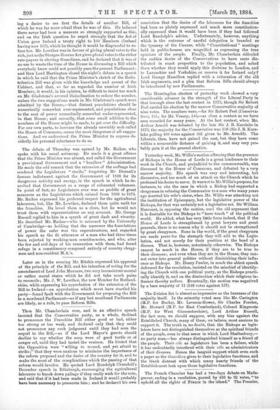Yesterday week, Mr. Willis's motion affirming that the presence of
Bishops in the House of Lords is a great hindrance to their work in the Church, and prejudicial to the commonwealth, was discussed in the House of Commons, and defeated by a very narrow majority. His speech was easy and interesting, but discursive, and too much of an attack on the Church which he professed his desire to serve. It was not to Mr. Willie's purpose, for- instance, to cite the case in which a Bishop had supported a clergyman in refusing the Communion to a man who many years. ago married his wife's sister, when Mr. Willis was attacking not the institution of Episcopacy, but the legislative power of the Bishops, for that was certainly not a legislative act. Sir William Harcourt, in opposing the motion, used the old argument that it is desirable for the Bishops to "have touch" of the political world. He added, what has very little force indeed, that if the House of Lords is strengthened by great lawyers and great generals, there is no reason why it should not be strengthened by great clergymen. None in the world, if the great clergymen are made peers for the strength they will add to the Legis- lation, and not merely for their position at the head of a diocese. That is, however, notoriously. otherwise. The Bishops cannot be much in the House, if they are to be true to. their dioceses ; and even when they are in the House, they can- not enter into general politics without diminishing their influ- ence as Bishops. Mr. Henry Fowler, in much the ablest speech delivered for the resolution, insisted on the mischief of identify- ing the Church with one political party, as the Bishops practi- cally identify it, and on the diminution which their religious in- fluence thereby suffers. Eventually, the motion was negatived by a bare majority of 11 (148 votes against 137).


































 Previous page
Previous page